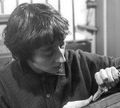She was born in 1924 in Belgrade. In 1946 she started printmaking studies at the École des Beaux-Arts in Paris, under Dimitris Galanis. Along with her husband, the sculptor Memos Makris, they were deported from France in 1951 due to their leftist political beliefs. They settled in Budapest where they lived until the late ‘70s, playing a vital role in the Hungarian artistic scene.
During that period, she produced significant work in printmaking and book illustration. At the same time she travelled to countries of the former Soviet Union, China (where she presented her first solo exhibition in 1956), and Cuba. Most of her drawings and prints were based on landscapes and impressions from her trips. In 1960 she travelled illegally to Greece, participating in a party mission, was arrested and jailed for a year in Averoff women’s prison, where she created a series of prints (woodcuts and linoleum) inspired by her inmates. That was the work she presented in her first solo exhibition in Athens (Zygos gallery, 1964). Part of that series was included in Yannis Ritsos’ book The Prison’s Tree and Women (Athens 1963, published by Epitheorissi Technis).
Apart from printmaking, drawings and book illustration, she also created mosaic and tapestry works, and works for public spaces. She has presented her work in solo exhibitions, not only in Hungary and Greece, but also in China, Cuba, Mexico, Cyprus and the U.S.A. Moreover, she participated in group exhibitions in many countries worldwide.
She has been awarded several times in printmaking exhibitions of the World Federation of Democratic Youth (Berlin 1953, Warsaw 1955, Moscow 1957, etc.), was honored twice with the Munkàcsy award (1959, 1963), and also received the ‘exceptional artist award’, the top Hungarian visual arts distinction (1984).
She died in Athens in 2014.
Makri Zizi (1924 - 2014)





